SMEs in China and How to Manage One: Part IV
Twenty early business lessons from a China entrepreneur
Lessons 16-20: From IP rip-offs to beyond China
This is part four of a four part series. To read part one please click here, part two is here, and part three is here.
Op-Ed Commentary: Chris Devonshire-Ellis
 Mar. 31 – With a business and equity partner now on board and sharing duties and responsibilities, the business began to grow rapidly. Come 1999, I had relocated from Shenzhen, leaving Alberto in charge there, to manage Shanghai. It promised to be our most lucrative office, but something wasn’t quite clicking. Although the staff were competent, being managed from another location with a fortnightly visit wasn’t really enough. It is important to inject dynamism into a business, and I went to Shanghai to provide that.
Mar. 31 – With a business and equity partner now on board and sharing duties and responsibilities, the business began to grow rapidly. Come 1999, I had relocated from Shenzhen, leaving Alberto in charge there, to manage Shanghai. It promised to be our most lucrative office, but something wasn’t quite clicking. Although the staff were competent, being managed from another location with a fortnightly visit wasn’t really enough. It is important to inject dynamism into a business, and I went to Shanghai to provide that.
I soon recruited an experienced, returning Chinese CPA as regional manager, and put her in charge. Older than the incumbent staff, she quickly developed a rapport with them and began to install better management and staff disciplinary systems – small things like making sure work was completed on schedule, and so on. This again left me free to market the firm, and Shanghai’s business revenues began to rise.
I’ve always been open about Dezan Shira, and my door has always been open to people wanting advice. Meeting one British expatriate businessman one day in my office, I gave him the knowledge he was seeking over his scheduled appointment about opening a representative office, and then the questions turned in a slightly curious manner. Asking about China Briefing (by then a very visible brand, especially among the expatriate community in China) he’d asked about domain registration. The internet was starting to boom, and I replied that I had intended to register the domain the very next day. I had said too much. This man, who I had given free time and extended professional courtesy to, registered the domain that afternoon, quite probably immediately after the meeting. It was only afterwards I found out that he’d deliberately made appointments with several expatriate businesses under the guise of a normal enquiry, but would turn the conversation around to their intellectual property. If it was lacking, and they hadn’t registered a domain – he’d snap it up. I soon got a request – and a bill for US$5,000 if I wanted the domain back. It is why, still today, our briefing domains have a dash in-between the words. Despite having published, sustained and provided a free source of valuable business information to the expatriate community at my own expense, someone had seen fit to rip me off. I was livid.
The domain later sold to a Chinese consultancy for US$10,000. We still don’t own it, but our SEO optimization and the strength of the China Briefing brand means the intended (now rogue) domain is kept well down the search engine rankings. But losing it did damage our business, and the China Briefing brand was compromised for a time while someone else profited, upon a brand they had effectively hijacked from all our hard work and efforts.
Lesson 16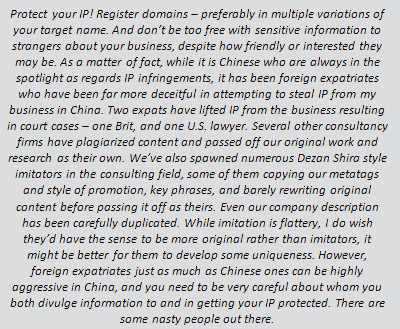 By this time the business was up to its fifth representative office, with Alberto having taken steps for the business to open an office in Guangzhou. However, the structure was proving uneconomical, unwieldy and restrictive in terms of what we could do, as ROs could not invoice locally. This was now starting to become a problem in terms of clients in China, who wanted to pay in RMB. However, the government had not yet passed regulations to permit the service industry, and financial administration (bookkeeping, tax filing, and so on) to be permitted as an activity for a WFOE – then only allowed to be used for manufacturing purposes. Nevertheless, we felt the time would soon come that WFOE scopes would be opened to permit services. We looked at the total costs of restructuring the business from a series of ROs to a WFOE and branches.
By this time the business was up to its fifth representative office, with Alberto having taken steps for the business to open an office in Guangzhou. However, the structure was proving uneconomical, unwieldy and restrictive in terms of what we could do, as ROs could not invoice locally. This was now starting to become a problem in terms of clients in China, who wanted to pay in RMB. However, the government had not yet passed regulations to permit the service industry, and financial administration (bookkeeping, tax filing, and so on) to be permitted as an activity for a WFOE – then only allowed to be used for manufacturing purposes. Nevertheless, we felt the time would soon come that WFOE scopes would be opened to permit services. We looked at the total costs of restructuring the business from a series of ROs to a WFOE and branches.
Including the assumed capitalization costs for one WFOE and four branches, the bill would come to a cash investment of about US$250,000. That was (and still is) a lot of money, and we would need to save up for it. Consequently we went on an austerity drive, and although the business was doing well, saved like mad to ensure we had enough capital reserves to meet our desire to obtain a WFOE license when the regulations permitted. It took us just over a year of hard saving to generate that, and at almost exactly the same time, the WFOE laws were relaxed. Service industries could now be part of a WFOE scope of business. By being alert and awake to the fact the WFOE laws were changing, we had made sure we had enough capital to convert our structure to take advantage of that at least a year ahead of any of our other competitors, who were still languishing in RO structures and were unable to invoice in RMB. Our accounting service revenues increased by 70 percent the following year as a result of our being prepared.
Lesson 17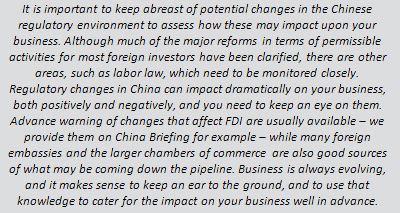 The WFOE restructuring took some time, as we first had to convert the Shenzhen RO, and replace that with a WFOE. Then, systematically, all of the other ROs were closed while simultaneously being slid over into a full WFOE branch structure. We also had to add in several other business scopes to our service WFOE license to permit us to provide various other services, and each of these required an increase in registered capital. We also completely overhauled our payroll system and got all staff on full time, fully paid up contracts. Our total overheads increased as a result of the structural and an improved structure much more in line with our needs. By 2002, 10 years after I had originally commenced trading, we were getting beyond SME levels and were now becoming a serious business in China. With Shanghai effectively sorted, I now turned my attentions to Beijing, which had performed adequately but again, still needed the attention of a Western-styled manager to get more out of the staff. I relocated from Shanghai to Beijing in the autumn of 2002 and took up residence at the St. Regis apartments.
The WFOE restructuring took some time, as we first had to convert the Shenzhen RO, and replace that with a WFOE. Then, systematically, all of the other ROs were closed while simultaneously being slid over into a full WFOE branch structure. We also had to add in several other business scopes to our service WFOE license to permit us to provide various other services, and each of these required an increase in registered capital. We also completely overhauled our payroll system and got all staff on full time, fully paid up contracts. Our total overheads increased as a result of the structural and an improved structure much more in line with our needs. By 2002, 10 years after I had originally commenced trading, we were getting beyond SME levels and were now becoming a serious business in China. With Shanghai effectively sorted, I now turned my attentions to Beijing, which had performed adequately but again, still needed the attention of a Western-styled manager to get more out of the staff. I relocated from Shanghai to Beijing in the autumn of 2002 and took up residence at the St. Regis apartments.
Lesson 18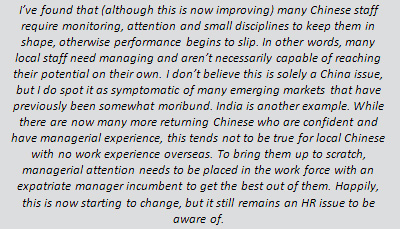 Although Dezan Shira now had few structural problems, the costs of supporting China Briefing were becoming prohibitive. Very successful in print form, it was now a web site carrying daily commentary and news, and required several staff to run it. Publishing is a restricted industry in China, and as a foreign publisher it was illegal for me to try and get any revenues into the magazine. Although other publishers tried to do deals with Mainland Chinese publishing houses and use their licenses as a cover for their own activities, I always felt that was a risky strategy. I didn’t want to have a majority Chinese partner in China Briefing, and I was uncomfortable with the highly grey area many foreign publishers were treading. It was to prove prophetic as first the founder of “That’s” – the Chinese version of “Time Out” that had expanded in Beijing, Shanghai and Guangzhou – was forced out of his own company, and then several others turned turtle or had similar problems. China Briefing was fiercely independent, but the costs of producing a full color, 12-page monthly magazine with a print run of 40,000 was getting too costly. Something had to change.
Although Dezan Shira now had few structural problems, the costs of supporting China Briefing were becoming prohibitive. Very successful in print form, it was now a web site carrying daily commentary and news, and required several staff to run it. Publishing is a restricted industry in China, and as a foreign publisher it was illegal for me to try and get any revenues into the magazine. Although other publishers tried to do deals with Mainland Chinese publishing houses and use their licenses as a cover for their own activities, I always felt that was a risky strategy. I didn’t want to have a majority Chinese partner in China Briefing, and I was uncomfortable with the highly grey area many foreign publishers were treading. It was to prove prophetic as first the founder of “That’s” – the Chinese version of “Time Out” that had expanded in Beijing, Shanghai and Guangzhou – was forced out of his own company, and then several others turned turtle or had similar problems. China Briefing was fiercely independent, but the costs of producing a full color, 12-page monthly magazine with a print run of 40,000 was getting too costly. Something had to change.
It happened in stages actually, as we moved to book publishing with Hong Kong ISBNs in order to get some legal sales into the China Briefing balance sheet. We launched our first book, a 350-page business guide to Shanghai, in 2003, and some 400 people attended the launch event at the Shanghai Radisson. We also sold a fair few copies, and after over a year of negotiating with banks were finally able to get an online credit card payment scheme for international online sales courtesy of the Bank of East Asia. Later, we stopped the facility of having the magazine for free online and turned that to pay for view as well. While online views of China Briefing Magazine decreased by 70 percent, I also generated 70 percent of the total print costs back in revenues, reducing the burden upon Dezan Shira in having to fund it. We additionally ramped up the news section (the site went through yet another overhaul at the beginning of this year) and views to that exploded as a result, more than making up our lost readers through no longer having free products. China Briefing was then folded into a separate company, Asia Briefing, as we looked to expand our portfolio of publishing titles further across Asia.
Lesson 19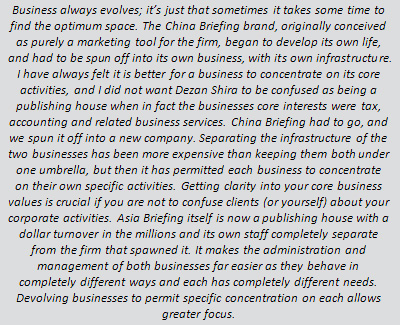 By the end of 2007, Dezan Shira & Associates had opened offices in Dalian, yet I was also starting to feel uneasy. Many Chinese consulting practices had opened up, and were now starting to compete. Foreign businesses in China are never able to compete on price with Chinese firms for a variety of reasons – they are more closely monitored, less able to bend the rules, and do not possess much of what the Chinese term “guanxi” (strategic relationships). I was wary of eventually being eaten alive by what I could see – and still do – as the emerging development of Chinese competitors. It is the local competition rather than other foreign firms in our industry space that have always been more of a competitive worry for me. I had two solutions to this. Firstly, if the firm were just to remain in the key cities of Beijing, Shanghai and Guangzhou, these also represented the most lucrative markets and competition would be intense. Although we had expanded to Dalian, we also needed to develop a far stronger regional presence in order to provide clients with a better infrastructure base than local firms were able. Consequently, we established satellite offices of our Shanghai branch in Ningbo and Hangzhou, and in Zhongshan (near Dongguan) from our Shenzhen WFOE. Today, those relatively new branches are our fastest growing in China. Growth is coming from the secondary locations.
By the end of 2007, Dezan Shira & Associates had opened offices in Dalian, yet I was also starting to feel uneasy. Many Chinese consulting practices had opened up, and were now starting to compete. Foreign businesses in China are never able to compete on price with Chinese firms for a variety of reasons – they are more closely monitored, less able to bend the rules, and do not possess much of what the Chinese term “guanxi” (strategic relationships). I was wary of eventually being eaten alive by what I could see – and still do – as the emerging development of Chinese competitors. It is the local competition rather than other foreign firms in our industry space that have always been more of a competitive worry for me. I had two solutions to this. Firstly, if the firm were just to remain in the key cities of Beijing, Shanghai and Guangzhou, these also represented the most lucrative markets and competition would be intense. Although we had expanded to Dalian, we also needed to develop a far stronger regional presence in order to provide clients with a better infrastructure base than local firms were able. Consequently, we established satellite offices of our Shanghai branch in Ningbo and Hangzhou, and in Zhongshan (near Dongguan) from our Shenzhen WFOE. Today, those relatively new branches are our fastest growing in China. Growth is coming from the secondary locations.
The second solution was to expand beyond China. If clients were faced with competition for services from firms within China, I felt that Chinese firms would not be able to compete with us so easily if we could also offer alternatives to China. Recognizing that China was starting to get expensive, and with a proposed new labor law expected to come into effect in 2008, I sensed that now would be a good time to take a look at getting us into other Asian markets. But which?
At the end of the day, I chose India because it had many similarities with China; it was huge, and we weren’t intimidated by that, it had a massive consumer market, and the manufacturing dynamics were cheaper than China. That was crucial as the majority of our clients are manufacturers. I spent 18 months going to and fro analyzing the market and the regulatory environment and we set up shop at the beginning of 2007 (using those serviced offices I spoke about earlier). We launched India Briefing as a web site and online magazine to support it, and went a step further by additionally launching a China-India focused web site, 2point6billion.com (the number refers to the combined population of both countries). Suffice to say we can now offer clients interested in investing in cost effective manufacturing an alternative. Realizing this was a sound strategy, we did the same in Vietnam. The firm now has ten China offices, five in India, and two in Vietnam. We are effectively hedged against problems in China, and can offer services beyond those of our China-based competitors.
Lesson 20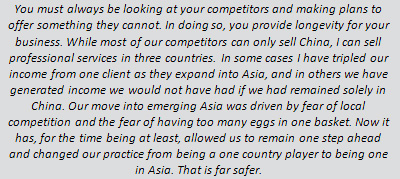 The truth about running an SME in China is that it pays to be diligent, and it pays to be analytical and patient. Above all, it pays to be prudent. I am not the smartest guy in China, nor is Dezan Shira the largest consulting business. But we have built a sustainable, profitable company that has reached a middle level sense of maturity and safety. And I have developed loyal and talented personnel, and that is what also counts. Always try to bring into your business someone better than you are. It’s only ego that stands in the way. If Chris Devonshire-Ellis, who had to begin his China career by supporting himself by being a DJ and teaching English can do it, I’m damn sure there are plenty of entrepreneurs out there who can do the same. I hope you have found this series of use and can help at least flag up some of the mistakes and some of the strategies I made when growing and managing my own SME.
The truth about running an SME in China is that it pays to be diligent, and it pays to be analytical and patient. Above all, it pays to be prudent. I am not the smartest guy in China, nor is Dezan Shira the largest consulting business. But we have built a sustainable, profitable company that has reached a middle level sense of maturity and safety. And I have developed loyal and talented personnel, and that is what also counts. Always try to bring into your business someone better than you are. It’s only ego that stands in the way. If Chris Devonshire-Ellis, who had to begin his China career by supporting himself by being a DJ and teaching English can do it, I’m damn sure there are plenty of entrepreneurs out there who can do the same. I hope you have found this series of use and can help at least flag up some of the mistakes and some of the strategies I made when growing and managing my own SME.
This is part four of an original four part series on managing and operating a SME in China from scratch. To read part one please click here, part two is here, and part three is here.
Chris Devonshire-Ellis is the founding partner and principal of Dezan Shira & Associates, a foreign direct investment practice offering legal establishment, tax, accounting and due diligence services throughout China. Established in 1992, the firm now has ten China offices, five in India and two in Vietnam.
Related Reading
 Chris’ popular book “The Story of a China Practice” details his early years of setting up in China and is a must read for all entrepreneurs interested in the country. It sold out its initial print run of 10,000 copies but is now available as a complimentary download from our Asia Briefing Bookstore here.
Chris’ popular book “The Story of a China Practice” details his early years of setting up in China and is a must read for all entrepreneurs interested in the country. It sold out its initial print run of 10,000 copies but is now available as a complimentary download from our Asia Briefing Bookstore here.
Dezan Shira Accounting Alliance Named Second Largest International Association
Devonshire-Ellis Named as ‘China Leading Light’
- Previous Article New Issue of China Briefing: Financial Management
- Next Article China Industry Report: Apr. 1









